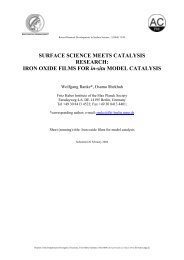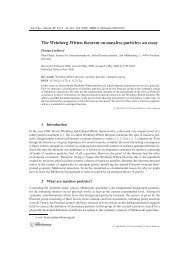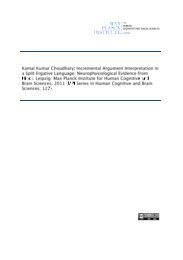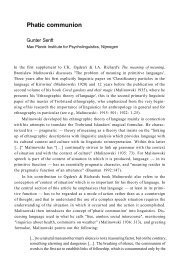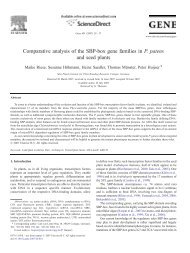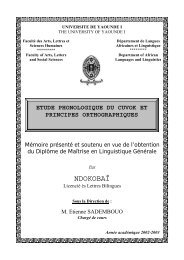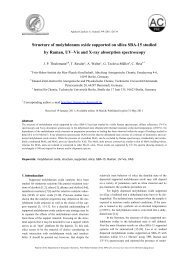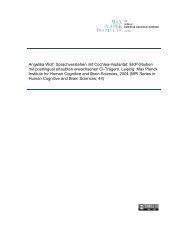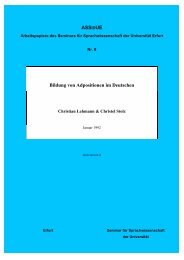Neural Correlates of Processing Syntax in Music and ... - PubMan
Neural Correlates of Processing Syntax in Music and ... - PubMan
Neural Correlates of Processing Syntax in Music and ... - PubMan
You also want an ePaper? Increase the reach of your titles
YUMPU automatically turns print PDFs into web optimized ePapers that Google loves.
<strong>Music</strong>al Tra<strong>in</strong><strong>in</strong>g 33<br />
without substantial amounts <strong>of</strong> tra<strong>in</strong><strong>in</strong>g. Secondly, there is a lack <strong>of</strong> conv<strong>in</strong>c<strong>in</strong>g positive<br />
<strong>and</strong> a substantial amount <strong>of</strong> negative evidence for <strong>in</strong>nateness <strong>of</strong> complex cognitive functions:<br />
To date, there is no evidence <strong>of</strong> specific gene systems affect<strong>in</strong>g high-level performance<br />
<strong>of</strong> special skills <strong>in</strong> a predictive <strong>and</strong> selective manner. Moreover, genetically<br />
<strong>in</strong>fluenced traits are expressed <strong>in</strong> <strong>in</strong>teraction with a particular environment. Thirdly,<br />
other measurable factors may contribute to variability <strong>in</strong> performance: opportunities,<br />
preparatory experiences, encouragement, support, motivation, self-confidence, perseverance,<br />
<strong>and</strong> concentration (Howe, 1975, 1980). Moreover, there are less measurable<br />
factors as differences <strong>in</strong> quality <strong>of</strong> <strong>in</strong>struction, effectiveness <strong>of</strong> practice strategy, <strong>and</strong><br />
degree <strong>of</strong> enthusiasm. F<strong>in</strong>ally, only weak correlations were found between general <strong>in</strong>telligence<br />
<strong>and</strong> various specific abilities <strong>in</strong> many doma<strong>in</strong>s (see, e.g., Ceci, 1996; Ceci &<br />
Liker, 1986) <strong>in</strong>clud<strong>in</strong>g music (Shuter-Dyson, 1999). Cognitive ability was shown to<br />
merely <strong>in</strong>fluence the early performance with<strong>in</strong> a doma<strong>in</strong> whereas f<strong>in</strong>al performance is<br />
poorly predicted (Ackerman, 1988; Hul<strong>in</strong>, Henry, & Noon, 1990).<br />
To <strong>in</strong>vestigate, whether there are pre-exist<strong>in</strong>g neural, cognitive, or motor markers for<br />
musical abilities, 5- to 7-year-olds beg<strong>in</strong>n<strong>in</strong>g piano or str<strong>in</strong>g lessons were compared to<br />
children <strong>of</strong> the same age (Norton et al., 2005). Neither neural, cognitive, motor or musical<br />
differences nor any correlation between musical perceptual skills <strong>and</strong> any bra<strong>in</strong> or<br />
visual-spatial measures were found between the groups: Thus, it is highly likely that<br />
exceptional abilities are more consistently expla<strong>in</strong>ed as acquired skill than as <strong>in</strong>nate<br />
talent. Moreover, the exceptional performance <strong>of</strong> musicians is highly predictable by<br />
their amount <strong>of</strong> accumulated deliberate practice <strong>and</strong> the beg<strong>in</strong>n<strong>in</strong>g <strong>of</strong> musical tra<strong>in</strong><strong>in</strong>g<br />
(Ericsson et al., 1993).<br />
Influences <strong>of</strong> musical tra<strong>in</strong><strong>in</strong>g on general cognitive functions<br />
<strong>Music</strong>al tra<strong>in</strong><strong>in</strong>g <strong>in</strong>volves long periods <strong>of</strong> focused attention, daily practice, read<strong>in</strong>g musical<br />
notation, memorization <strong>of</strong> extended musical passages, learn<strong>in</strong>g about a variety <strong>of</strong><br />
musical structures, <strong>and</strong> mastery <strong>of</strong> technical (e.g., f<strong>in</strong>e-motor) skills. It is, thus, supposed<br />
to have a positive impact on cognition, particularly dur<strong>in</strong>g childhood years, when<br />
bra<strong>in</strong> development is highly plastic <strong>and</strong> sensitive to environmental <strong>in</strong>fluence (P. R.<br />
Huttenlocher, 2002).<br />
W<strong>in</strong>ner <strong>and</strong> Cooper (2000) conducted a meta-analysis on studies <strong>in</strong>vestigat<strong>in</strong>g the relation<br />
between arts education <strong>and</strong> academic achievement. Even though there seem to be<br />
some transfer effect, the effect sizes are relatively small (<strong>and</strong>, <strong>in</strong> addition, consistently<br />
smaller for experimental than for correlation studies). Correlations, as those found between<br />
musical ability <strong>and</strong> other cognitive <strong>and</strong> academic abilities, have been observed<br />
for many forms <strong>of</strong> arts tra<strong>in</strong><strong>in</strong>g. However, there is no evidence yet that study<strong>in</strong>g arts has



